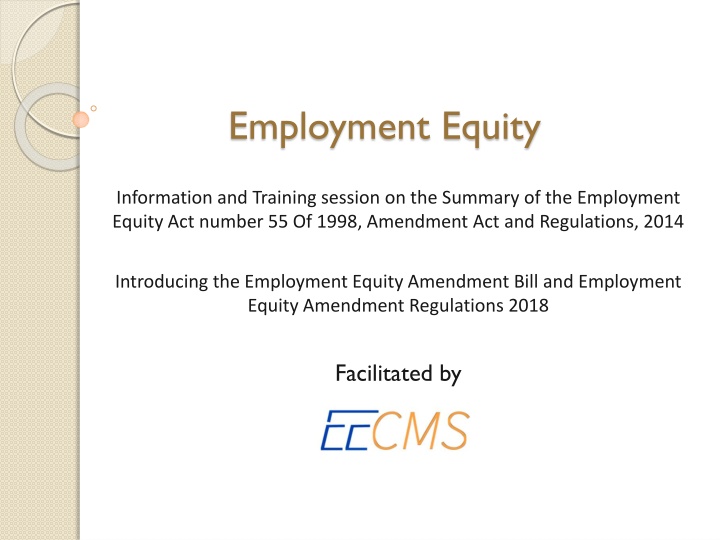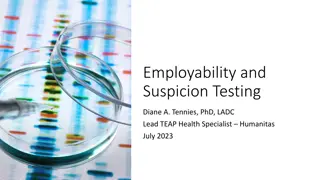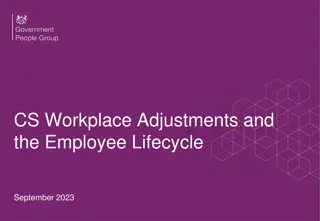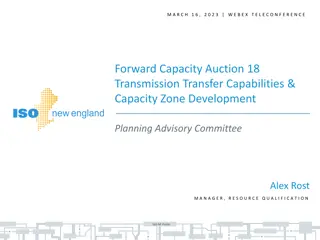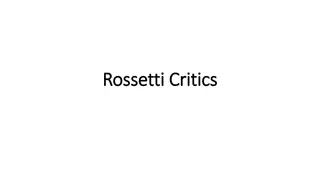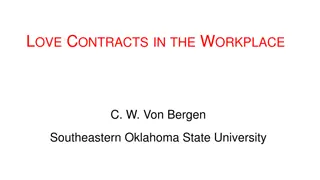Christina Binion's Workplace Capabilities
Christina Binion, a dedicated and practical Production Manager, shares her strengths and career insights. Explore her journey towards self-improvement and job success through workplace documents and career development theories.
Download Presentation

Please find below an Image/Link to download the presentation.
The content on the website is provided AS IS for your information and personal use only. It may not be sold, licensed, or shared on other websites without obtaining consent from the author.If you encounter any issues during the download, it is possible that the publisher has removed the file from their server.
You are allowed to download the files provided on this website for personal or commercial use, subject to the condition that they are used lawfully. All files are the property of their respective owners.
The content on the website is provided AS IS for your information and personal use only. It may not be sold, licensed, or shared on other websites without obtaining consent from the author.
E N D
Presentation Transcript
Employment Equity Information and Training session on the Summary of the Employment Equity Act number 55 Of 1998, Amendment Act and Regulations, 2014 Introducing the Employment Equity Amendment Bill and Employment Equity Amendment Regulations 2018 Facilitated by
Summary of Employment Equity Act Purpose of the Act To achieve equity in the workplace by promoting equal opportunity and fair treatment in employment through the elimination of unfair discrimination Implementing affirmative action measures to redress the disadvantages in employment of designated groups Definition of Designated Group Designated Group includes - African Males - African Females - Coloured Males - Coloured Females - Indian Males - Indian Females - White Females - All disabled staff (including white disabled males) TARGET 2%
Summary of Employment Equity Act Designated Group excludes (i.e Non-Designated) - White Males - Foreign nationals Who needs to comply? - A Designated Employer means an employer who employs 50 or more employees, or has a total annual turnover as reflected in Schedule 4 of the Act, Municipalities and Organs of State - Employers can also volunteer to become Designated Employers
Summary of Employment Equity Act Total annual turnover Sector or sub-sectors in accordance with the Standard Industrial Classification R 6.00m. Agriculture R 22.50m. Mining and Quarrying R 30.00m. Manufacturing R 30.00m. Electricity, Gas and Water R 15.00m. Construction R 45.00m. Retail and Motor Trade and Repair Services R 75.00m. Wholesale Trade, Commercial Agents and Allied Services R 15.00m. Catering, Accommodation and Other Trade R 30.00m. Transport, Storage and Communications R 30.00m. Finance and Business Services R 15.00m. Community, Social and Personal Services
Summary of Employment Equity Act Prohibition of Unfair Discrimination - No person may unfairly discriminate against an employee in any employment policy or practice - Discrimination can be based on any of the following grounds, but is not limited to: Race Gender Pregnancy Marital status Family responsibility Ethnic or social origin Colour Sexual orientation Age Disability Religion HIV status
Summary of Employment Equity Act Conscience Belief Political opinion Culture Language and Birth It is not unfair discrimination to promote affirmative action consistent with the Act or to prefer or exclude any person on the basis of an inherent job requirement. Medical Testing: Permissible only when legislation requires testing or when this is justifiable for various reasons. HIV testing is prohibited unless such testing is determined to be justifiable by the Labour Court (HIV Policy will be discussed)
Summary of Employment Equity Act Powers of Labour inspectors Labour Inspectors have the authority to enter, question and inspect as provided for in section 65 and 66 of the Basic Conditions of Employment Act. Undertaking to comply If the Labour Inspector has reasonable grounds to believe that an Employer has failed to comply with its obligations in terms of the Act , the Inspector will obtain a written undertaking to comply within a specified period. Compliance order A Labour Inspector may issue a compliance order if a Designated Employer failed to comply with sections 16, 17, 19, 22, 24, 26 or 35
Summary of Employment Equity Act Review by Director-General (DG) 1. The Director-General may conduct a review to determine whether an Employer is within compliance of the Employment Equity Act 2. In order to conduct the review the DG may Request a copy of current analysis and employment equity plan Any other documentation that could be relevant to the review of employers compliance Request a meeting with the employer to discuss all matters relevant in compliance with the act Request a meeting with any of the following - i. Employee or trade union consulted in terms of section 16 ii. Workplace forum iii. Any other person with relevant information Make a recommendation (DG Review)
Summary of Employment Equity Act Review by Director-General (DG) continued 1. The Labour Court has the power to make any appropriate orders, award compensation or impose a fine. 2. Amended fines: Section 16 and 17 (Consultation with employees) Section 19 (EAP Analysis and barriers) Section 20 (Employment Equity Succession Plan) Section 21 (EEA2 and EEA4 report submitted to DOL) Section 22 (Public Company to capture summary in Annual Report) Section 23 (Successive Employment Equity Plan) Section 24 (Assign Senior Manager) Section 25 (Duty to inform) Section 26 (Keep hard copy of records) Section 43 (Review on DG request) Section 44 (b) Implement recommendations by DG 3. Fines payable to the National Revenue Fund
Summary of Employment Equity Act Amended fines Contravention Section 16, 17, 19, 22, 24, 25, 26 and 43(2) Section 20, 21, 23 and 44 (b) No previous contravention R1 500 000 Greater of R1 500 000 or 2% of TO One previous contravention in respect of the same provision R1 800 000 Greater of R1 800 000 or 4% of TO Previous contravention within 12 months or two previous contraventions with respect to the same provision within 3 years R2 100 000 Greater of R2 100 000 or 6% of TO Three previous contraventions with respect to the same provision within 3 years R2 400 000 Greater of R2 400 000 or 8% of TO Four contraventions with respect to the same provision within 3 years R2 700 000 Greater of R2 700 000 or 10% of TO
Summary of Employment Equity Act Section 13 (Duties of Designated Employer) Section 13 of the Employment Equity Act stipulates that a Designated Employer must implement affirmative action measures for Designated Groups to achieve employment equity. Designated Employer must: Consult with employees as per Section 16 (EE Forum); - Conduct an Economically Active Population (EAP) analysis as per Section 19 - Prepare an Employment Equity Plan as per Section 20 EEA13 -
Summary of Employment Equity Act Section 15 (Affirmative Action measures) Section 15 of the Employment Equity Act stipulates that a Designated Employer must implement affirmative action measures intended to ensure that suitably qualified employees from Designated Groups have equal opportunity and are equitably represented on all occupational levels of the workforce.
Summary of Employment Equity Act Section 16 & 17 (Consultation with employees and duty to inform) Section 16 and 17 of the Employment Equity Act nr 55 of 1998 stipulates that a Designated Employer must take reasonable steps to consult with representatives of employees representing the diverse interests of the workforce when conducting an EAP analysis, as well as an analysis of HR policies and practices, when preparing an Employment Equity Plan and when completing an EEA2 report. Amended fine for non compliance with this Section: R1 500 000 for a first contravention, increasing to R 2 700 000 for further contraventions in this regard.
Summary of Employment Equity Act Section 18 (Disclosure of information) Section 18 of the Employment Equity Act nr 55 of 1998 stipulates that a Designated Employer must disclose relevant information to the consulting parties (CEO, Employment Equity Manager, Employment Equity Forum and employees) when it engages in consultation to ensure effectiveness.
Summary of Employment Equity Act Section 19 (Analysis) Section 19 of the Employment Equity Act nr 55 of 1998 stipulates that a Designated Employer must conduct an analysis of employment policies, practices, procedures and working environment so as to identify employment barriers that adversely affect members from Designated Groups. The analysis must also include the development of a workforce profile to determine to what extent Designated Groups are under- represented in the workplace. EEA12: Qualitative Analysis and Quantitative Analysis - - Amended fine for non-compliance with this Section: R1 500 000 for a first contravention, increasing to R2 700 000 for further contraventions in this regard.
Summary of Employment Equity Act Section 20 (Employment Equity Plan - EEP) Section 20 of the Employment Equity Act stipulates that a Designated Employer must prepare and implement an Employment Equity Plan which will achieve reasonable progress towards employment equity in that Employer s workforce. Amended fine for non-compliance with this Section R1 500 000 or 2% of turnover for the first contravention, increasing to the highest of R2 700 000 or 10% for further contraventions in this regard.
Summary of Employment Equity Act Section 21 (EEA2 and EEA4 reports) Section 21 of the Employment Equity Act stipulates that a Designated Employer must submit its first report to the Director General (Department of Labour) within 12 months after the commencement of the Act (1999), or within 12 months after the date on which the employer became a designated employer. Thereafter the employer needs to submit every year. Note that small entities used to report every two years, now they need to report annually. R1 500 000 or 2% of turnover for the first contravention, increasing to the highest of R2 700 000 or 10% for further contraventions in this regard.
Summary of Employment Equity Act Section 22 (Publication of EEA2 report - Listed entities only) Section 22 of the Employment Equity Act stipulates that every Designated Employer that is a Public Company must publish a summary of the report required by Section 21 in its annual financial report. Amended fine for non-compliance with this Section: R1 500 000 for a first contravention, increasing to R2 700 000 for further contraventions in this regard.
Summary of Employment Equity Act Section 23 (Successive Employment Equity Plan) Section 23 of the Employment Equity Act stipulates that a Designated Employer must, before the end of the term of its current Employment Equity Plan, prepare a subsequent Employment Equity Plan. It is advisable to start to prepare six months prior to expiry of current EEP. R1 500 000 or 2% of turnover for the first contravention, increasing to the highest of R2 700 000 or 10% for further contraventions in this regard.
Summary of Employment Equity Act Section 24 (Designated Employer must assign a EE Manager) Section 24 of the Employment Equity Act stipulates that a Designated Employer must assign one or more Senior Manager(s) to ensure implementation and monitoring of the Employment Equity Plan and MUST make available necessary resources for this purpose. The fine for non-compliance with this Section: R1 500 000 for a first contravention, increasing to R2 700 000 for further contraventions in this regard.
Summary of Employment Equity Act Section 25 (Duty to inform) Section 25 of the Employment Equity Act stipulates that an Employer must display at its workplace (where it can be read by employees) a notice in the prescribed form, informing them about the provisions of the Act. Thus; EEA3 Summary of the Act The fine for non-compliance with this Section: R1 500 000 for a first contravention, increasing to R2 700 000 for further contraventions in this regard.
Summary of Employment Equity Act Section 26 (Duty to keep records) An Employer must establish, and for the prescribed period, maintain records in respect of its workforce, its Employment Equity Plan and any other records relevant to its compliance with the Act. The fine for non-compliance with this Section: R1 500 000 for a first contravention, increasing to R2 700 000 for further contraventions in this regard.
Summary of Employment Equity Act Section 27 (Income Differentials) Section 27 of the Employment Equity Act stipulates that every Designated Employer, when reporting, must submit a statement, as prescribed, to the Employment Conditions Commission established by section 59 of the Basic Conditions of Employment Act, on the remuneration and benefits received in each occupational level of that Employer s workforce. Thus, EEA4 report to be submitted to the Department of Labour (the Employment Conditions Commission is a commission of DOL)
Summary of Employment Equity Act Section 43 (Review by Director General) and 44 (Outcome of Director General s review) Review and outcome of the Director General s review Need to comply on such a request The fine for non-compliance with Section 43(2): R1 500 000 for a first contravention, increasing to R2 700 000 for further contraventions in this regard. The fine for non-compliance with Section 44(b): R1 500 000 or 2% of turnover for the first contravention, increasing to the highest of R2 700 000 or 10% for further contraventions in this regard.
THE END EECMS would hereby like to thank you for your time. Feel free to contact us for further queries. CP du Toit (Pieter) SCAN QR CODE TO VISIT US BComm. Fin. Acc. Bcomm. (HONS) Internal Audit 079 847 1750 cp@eecms.co.za www.eecms.co.za
